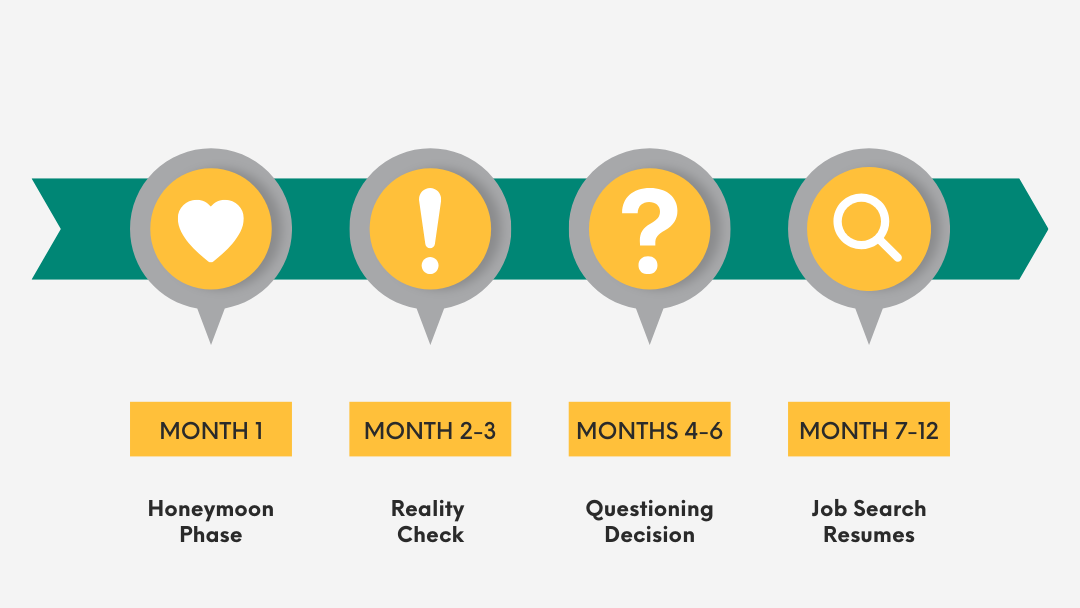Preparing for candidate negotiations
After months of searching, you’ve found the perfect candidate. They’ve accepted your offer, and you’re excited about their start date. Then, the call comes that they’ve received a counter-offer from their current employer and are reconsidering their decision.
This moment represents a critical juncture in the hiring process. Understanding why counter-offers typically fail and how to navigate this situation can save you considerable time and disappointment.
The psychology behind counter-offers
When an employee hands in their notice, employers often respond with a counter-offer. This is typically a salary increase, perhaps a new title, or promises of future growth. At face value, these offers appear to address the apparent reason for leaving. However, recruitment industry data consistently shows that the majority of employees who accept counter-offers still leave within a year, with most departing within 24 months.
Most departures aren’t primarily about money. HR professionals widely acknowledge that when employees decide to leave, it’s rarely just about compensation. The counter-offer might temporarily address salary concerns, but it doesn’t fix the underlying issues that led to dissatisfaction.
The real reasons people leave
When candidates explore new opportunities, their motivations typically run deeper than just salary. A lack of meaningful work, poor management relationships, limited growth prospects, misalignment with company culture, work-life harmony concerns, and feeling undervalued can all contribute to job dissatisfaction. A counter-offer with more money doesn’t address these fundamental issues.
“We believe in the importance of happiness in the workplace—being stressed and unhappy is not a badge of honour. When people are placed in the right roles and feel supported, they work harder and perform better.”
The counter-offer timeline
Recruitment specialists have observed a predictable pattern:

The initial honeymoon phase (month 1) when the employee feels valued, followed by a reality check (months 2-3) as the initial glow fades and they realise the fundamental issues remain unchanged. By months 4-6, the employee questions their decision to stay, and typically within 7-12 months, they resume their job search, often more determined than before.
Why accepting a counter-offer can harm career development
Trust issues can emerge once an employee has shown their willingness to leave. The relationship with their employer changes, and they may be passed over for sensitive projects or leadership opportunities.
The salary increase typically offered doesn’t reflect newly recognised value but rather what the employee was already worth to the company. This raises an uncomfortable question – why did it take a resignation to receive appropriate compensation?
Staying in a role that wasn’t meeting their needs delays professional development and can lead to stagnation. Meanwhile, the candidate may damage relationships with both their current employer and the prospective employer whose offer they declined.
Preparing for counter-offer situations
Effective preparation begins during the interview process by thoroughly discussing candidates’ motivations and asking specific questions about counter-offer scenarios. When making an offer, ensure it addresses the candidate’s motivations beyond compensation. Highlight unique aspects of your opportunity and move quickly once the candidate shows serious interest.
After offer acceptance, maintain regular contact with the candidate, involve them in relevant events where appropriate, and begin the onboarding process before their official start date. Have senior leadership express enthusiasm about their arrival and promptly address any concerns.
Managing counter-offer situations
When counter-offers happen, remain calm and professional. Reaffirm the reasons the candidate was interested in your opportunity and listen to their concerns without immediately making concessions. Consider whether adjustments to your offer are appropriate based on new information, but avoid engaging in a bidding war.
Building resilient recruitment processes
Organisations with counter-offer resilience share certain characteristics that create an environment where candidates are less likely to be swayed by last-minute offers. These include a strong employer brand, transparent recruitment processes, thoughtful onboarding, competitive total rewards that reflect market reality and meaningful work that creates connection and purpose.
Human resources best practices indicate that organisations with structured onboarding processes experience significantly greater new hire productivity and improved retention rates.
The Thrive Team’s strategic search partnership
At The Thrive Team, we’ve developed a comprehensive search process specifically designed to minimise counter-offer risks and ensure successful placements.
Our process goes beyond traditional recruitment by addressing counter-offer risks at multiple stages. During our initial approach (step 3), we thoroughly explore candidates’ motivations and commitment to change. Our detailed interviews (step 4) delve into candidates’ career aspirations and underlying job satisfaction factors, ensuring we understand what would make them thrive in a new role beyond just salary considerations.
At the offer and resignation stage (step 8), we actively counsel candidates through the process of resigning and dealing with counter-offers. Most distinctively, we maintain support throughout the notice period (step 9), offering regular contact during this vulnerable time when counter-offers are most likely to be accepted.
For executive placements, we also offer coaching and development (step 10) focussing on supporting candidates during the transition period. This demonstrates a commitment to their long-term success that counter-offers can’t match.
This thorough approach creates placements that are resistant to counter-offers because they address deeper career aspirations rather than just financial considerations.
The best defence against counter-offers is creating an organisation where people want to work. One where purpose, values, and happiness matter as much as compensation.
Do you need support with your hiring strategy?
Our Talent Acquisition services include comprehensive candidate management that minimises counter-offer risk and ensures smooth transitions. We work with both clients and candidates to create meaningful matches that last.
Book a consultation to discover how we can help you build resilient hiring processes that attract and retain top talent.


